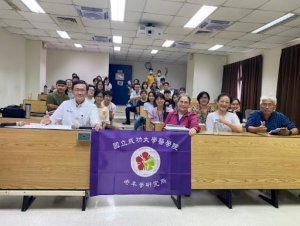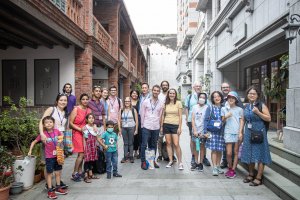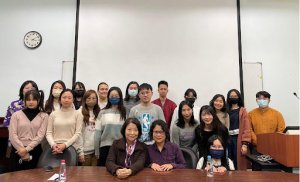The fruitful journey to Harvard
I felt honored to have been awarded the Fulbright Senior Scholar Grant (2022-August) to visit the Faculty of Arts and Sciences at Harvard University. Having received my Ph.D. in the U.S. many years ago, I am very glad to return once again as a Harvard visiting scholar in Boston. It is also a privilege to be selected as the visiting scholar of Harvard Yenching Institute (HYI), a prestigious foundation founded in 1928 and dedicated to advancing Asian higher education by cultivating excellent scholars in humanities and social sciences. As the first HYI scholar from Taiwan’s communication discipline, I felt so blessed to conduct my health misinformation mixed-method research in this resourceful institute and immerse myself in its interdisciplinary environment to engage with outstanding Asian scholars from diverse humanity backgrounds.
While committed to my ongoing research projects, I keenly audited courses and vibrantly exchanged research ideas with Harvard faculty and engaged in scholarly activities and attended inspiring seminars in research centers (Berkman Center for Internet & Society, Harvard Center for Health and Happiness, and Radcliffe Institute). Meanwhile, I gave invited talks and interacted with scholars in other top communication schools (e.g., Boston University) and research centers (e.g., Standford Social Media Lab and MIT Media Lab), in order to share research insights, enrich my perspectives and horn research skills. Additionally, I got a competitive grant to organize HYI Workshop titled Post-truth politics and public health: Dis- and misinformation crises and media challenges in March 2023. Furthermore, I actively participated in major communication conferences (i.e., NCA, PTC, BEA, ICA, IAMCR and AEJMC) to moderate sessions and present research outcomes related to health misinformation and socialbot projects. In May 2023, I was elected as the Vice President of Chinese Communication Association (國際中華傳播學會) (2023-2025) and will resume the President in the next two years.
Research Work and Deliverables
My mixed method research project focuses on investigating health misinformation risks on COVID-19 preventive measures (e.g., vaccination) and evaluating digital literacy effects on mitigating infodemic. First, I used structural equation modeling (SEM) to analyze a web survey dataset, which investigates Taiwanese COVID-19 health misinformation, digital and health literacy, epidemic prevention measures, and vaccine intention using. Secondly, I conducted systematic content analysis of health misinformation messages debunk by two fact-checking institutes, which aims to explicates health misinformation’s content types, characteristics, and motives after Taiwan’s COVID-19 Level 3 Alert. To share preliminary research insights, I have given a hybrid Harvard Yenching research titled “Mitigating COVID disinfodemic: Health misinformation, digital literacy and vaccination in Taiwan” in December 2022. I first shared content analysis results of health misinformation after Taiwan’s Level 3 alert, which showed three salient types of vaccine effectiveness, epidemic prevention cures, and government prevention measures, with the motives of conspiracy theories, panic stirring and political smearing. Next, I reported web survey results related to social media users’ (dis)misinformation efficacy and COVID-19 health literacy. This research talk generated lively discussions and positive feedback among interdisciplinary scholars from various countries. In February 2023, I was invited for another talk titled “COVID-19 health misinformation, digital literacy, and mitigation in Taiwan” at Bridgewater State University. I shared research findings on health misinformation and digital literacy in Taiwan, and received enthusiastic feedback.
Dis- or misinformation in politics and public health are two critical and urgent issues that cause tremendous anxiety, risks and harm domestically and internationally. To mitigate infodemics (in politics and public health), it is essential to have interdisciplinary efforts devoted to investigate the crises, tackle the challenges and find feasible solutions collectively. Receiving a competitive HYI grant, I organized “Post-truth politics and public health: Dis- and misinformation crises and media challenges” workshop on March 24, 2023. It aims to invite scholars and experts to share research insights regarding political disinformation and health misinformation in various contexts, as well as explore effective measures to mitigate political and health falsehoods. Several well-known scholars were invited to present their studies in relation to two themes: (1) socio-political disinformation, computational propaganda and democracy risks and (2) Health misinformation, media trust & public health threats. I also presented research insights about “Socialbots, computational propaganda and disinformation threats in Taiwan’s politics and elections.” We had stimulating and fruitful discussions and exchange research ideas for future collaboration in the one-day workshop.
Inaddition, my health misinformation research outputs include two international conference papers. The first paper, titled “Health misinformation, ideology polarization, and digital literacy in Taiwan,” explores the relationships between attitudes towards health misinformation, media literacy, ideological polarization, and COVID-19 health literacy. It also examines how the factors influences the public in discerning COVID-19 misinformation and adopting vaccination. In July 2023, this paper was presented at The International Association for Media and Communication Research (IAMCR) in Lyon, France. The second paper is titled “Alleviating Coronavirus disinformation: Examining influences of social media (dis)information efficacy, critical social media post, and health literacy on preventive measures and vaccination.” This study first examines complex relationships among social media information efficacy, disinformation efficacy, critical social media posts, and health literacy. It further investigates the influences of health literacy on adopting preventive measures and vaccinations, in addition to analyzing the associations of health literacy’s components with key variables. This paper was presented at 2023 Association for Education in Journalism and
Mass Communication (AEJMC) conference in Washington, D.C.
As a noted new media scholar, I was invited to give talks in the doctoral seminar of Emerging Media Studies in Boston University and visited Stanford Social Media Lab to share my socialbot research insights. The mixed-method findings reveal how socialbots have been used in Taiwanese politics and their relationship with computational propaganda, disinformation and threats to democracy. With respect to malicious disguised socialbots, the web survey finds that when users perceive high risk in disguised socialbots, their intention to take protective and defensive measures increase; socialbot usage has positive associations with danger control appraisal (i.e., self-efficacy and response efficacy).
During the one-year research visit, I have audited four courses at Harvard Kennedy School, Law School, and the Department of Sociology, enriching my perspectives on various issues and inspiring my research and teaching. I found immense satisfaction when attending research sharing seminars where interdisciplinary dialogues led to stimulating and insightful discussions. Fulbright program also gave me the great opportunity to meet international scholars from different fields and learn from one another. Additionally, the rich resources of Harvard Libraries have left strong impressions on me. Beyond boasting the world’s largest academic collection, each library holds its own cultural and historical significance. I felt lots of joys when studying, writing papers and working in fantastic Harvard Libraries.
Additionally, I attended six prestigious communication conferences to present my works to wide audiences, networking and exchange research insights with excellent scholars in their respective fields. In addition to the aforementioned IAMCR and AEJMC, I also attended NCA (National Communication Association, New Orleans), PTC (Pacific Telecommunications Council, Honolulu), BEA (Broadcast Education Association, Las Vegas) and ICA (International Communication Association, Toronto) to present research papers and play the conference/research chairs or discussants for CCA research sessions. Due to my academic reputation and 12-year contributions to global Chinese Communication scholarly community, I have been elected as the CCA Vice President (2023-2025) to oversee its research development and supervise its research sessions in ICA, NCA and AEJMC.
Life beyond work
Life in Boston is like living a beautiful dream. Participating many interesting social events (e.g., skiing and lobster picnic), festivals and receptions at Harvard University, I made many friends and had a terrific time with HYI cohorts. At my leisure, I found joy and inner peace while strolling on Harvard campus and walking along the Charles River. While attending conferences, I travelled in US to explore beautiful cities and visiting amazing museums as well as experienced local cultures. This year is definitely one of my best and most unforgettable in life!
Impact
The past year as a Fulbright scholar (and a HYI scholar) in Boston has been remarkably fruitful and productive. As someone deeply passionate about academic research, I enjoyed my learning journey in this prestigious institute and dedicated myself to research with academic freedom. Thanks again to the Fulbright foundation! This year’s Harvard life has been a transformative chapter in my academic journey. The meaningful research visit has improved my research and teaching capabilities, which helps me make substantial contributions to academia, professional communities, industry, and society.
Managing Editor: Chia-Ying Liao 廖佳盈







